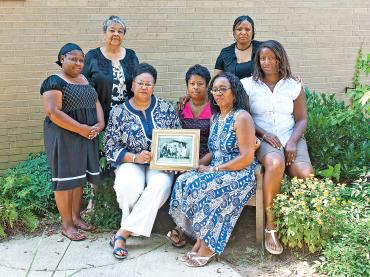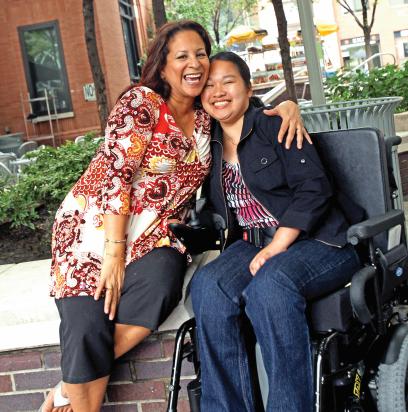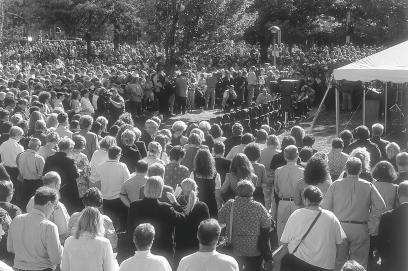Some AFT members were working at what would become ground zero on the morning of Sept. 11, 2001, when two hijacked planes took down the twin towers at the World Trade Center in New York City. Some AFT members rushed to care for the first responders. And some of today’s AFT members were not yet born.
For some of the youngest survivors—thousands of children who watched the towers fall from their classroom windows—this was only their second day of school.
Among nearly 3,000 people who perished that day were dozens of AFT public employees, including members of the New York State Public Employees Federation and two members of the Professional Staff Congress at the City University of New York. In Washington, D.C., three members of the Washington Teachers’ Union died with their 11-year-old students when their plane crashed into the Pentagon. They had just taken off for California to attend a National Geographic program on marine biology.
But even as the horror unfolded, AFT members lived up to the highest standards of their professions. Two special education paraprofessionals who worked at a school next to the towers partly wheeled and partly carried their wheelchair-bound students through streets choked with debris and ash. Arriving late that afternoon at the home of one of the girls, her para simply said: “I have her.” Ten years later, the student and para remained fast friends.
On that day in 2001, a stunned nation struggled to comprehend what had happened. But AFT healthcare workers from New York and New Jersey rushed to the scene, setting up triage centers that, in the end, were barely used because so few survived.
These members gradually realized they could help the first responders, venturing over to the disaster site and offering eye washes and drinks of water to the rescue workers, as well as protective gear, clean socks and hugs. They even ministered to injured rescue dogs. “We walked around looking for a place that needed us,” one said.
Months later, though, the intensive care nurses, psychiatric nurses, paramedics, EMTs and visiting nurses said they still felt haunted by their empty triage centers and a job they felt was left undone.
One psychiatric nurse, a member of the Health Professionals and Allied Employees in New Jersey, spent three days serving as a crisis counselor at ground zero, and then continued to volunteer with survivors among the first responders. Other nurses helped patients with breathing problems because of the heavy wall of ash that had rolled through the city and lingered in the air. Smoke rose from the site for weeks.
The attacks forced the immediate evacuation of 8,000 students in eight Manhattan schools. One high school two blocks from the trade center was commandeered as a morgue after the attacks, which had sent students and staff running through a horrific scene of falling debris, ghastly glimpses of death, choking and confusion. Staff and students were transferred to another high school.
Two elementary schools also relocated. Two days after the attacks, then-president of the United Federation of Teachers, Randi Weingarten (now president of the AFT), visited a school in Brooklyn to talk about the tragedy with students and staff.
AFT members figured heavily among the ranks of volunteers who turned out in the aftermath of the attacks. Word came that the rescuers had so many volunteers that they began to weigh offers of help based on whether the volunteers had union cards. “That card was evidence of a level of professionalism and skill that made me proud to be a union member,” said a member of the AFT-affiliated United College Employees of the Fashion Institute of Technology/SUNY. In the end, hundreds of union members volunteered to work in the recovery zone.
In Washington, D.C., AFT nurses stepped up. One member, a burn specialist, came back from vacation to help treat patients who were severely burned in the crash at the Pentagon. She recalled seven patients at the large-burn unit in one night, compared with the normal rate of one patient every couple months.
Despite their extreme injuries, she found ways to comfort the victims: “We talk to them. We explain what we’re doing. And you can put on a pair of gloves and hold their hand. I would lay my hand on their chest or put my hand on their forehead, telling them everything would be OK.”
Teaching through tragedy
The day after 9/11, a community college professor and AFT member on Long Island, N.Y., dreaded having to teach. With his heart in his throat, he talked with students about what they had seen, the friends whose lives they still feared for, what forms of retaliation the U.S. might take, and their hopes despite it all.
The Professional Staff Congress at CUNY sponsored forums to allow open discussion on the disaster. At one forum, a Muslim professor described his many hours taking part in teach-ins and attending memorial services.
“We need to work harder to let people know about each other’s cultures,” he said. “My religion, which is Islam, is a well-kept secret in America.”
The Public Employees Federation held a memorial service in Albany weeks later to honor its 34 members killed at the World Trade Center. Members set up empty chairs, each draped with a New York state flag, in remembrance of the state employees who died.
Unions around the world rushed in to offer their condolences and solidarity, with messages flooding AFT headquarters from labor organizations including Education International as well as unions in Palestine, Israel, Nigeria, Zimbabwe and Russia.
Of particular help were letters of encouragement and support from students in other places. One New York school received 300 letters from students in St. Paul, Minn., and the New York students jumped at the chance to reply.
Support in many forms
The United Federation of Teachers helped develop a set of guidelines for supporting students’ recovery. School communities also worked to make sure that tolerance and respect for diversity did not vanish. Just days after the attacks, the UFT provided teachers with a compilation of resources to help counter the backlash against Arab Americans and Muslims by showing students the right ways to deal with pain and anger.
Our national union, for its part, launched an unprecedented effort to raise money for crisis counseling, books and supplies. It leased copy machines for five schools that had to relocate. The newly created AFT Recovery Fund, together with a joint AFT-National Education Association fund and the AFT’s insurance program, issued checks to the families of the three members who died in Washington, D.C.
“It’s going to take some time,” said a local leader two months after 9/11, “but I think with the proper support we’ll be able to get through.”
[Annette Licitra]



